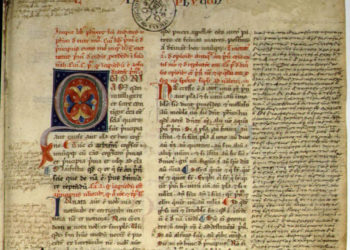In an era when there is too little time and too much to read, the New Books Network (NBN) offers podcasts of author interviews that provide context for their work and connect readers to their books. Hosted by Amherst College Press, the NBN has grown rapidly. As an independent service, it aggregates the audience for scholarly books on a variety of specific subjects in a way that no single publisher could.
A query about the New Books Network from a reader following the August 9th post about an online bookstore for scholarly works prompted the following interview with its founder, Marshall Poe. Marshall is a former history professor, one-time editor and writer for The Atlantic, and now the editor-in-chief of the NBN.

What was your inspiration to create the New Books Network?
In 2006 a journalist asked me to do an interview about an article I wrote for The Atlantic, a podcast interview, as it happened. I was curious and asked him about podcasting. He explained it. It immediately dawned on me that podcasting might be a good way to get the word out about books. I had always liked author interviews, the kind you occasionally hear on the radio.
I also knew — as a former professor and academic author — that university presses (UPs) had a hard time publicizing their books. They produce great books, but they don’t have the budgets to publicize them. I thought (and think) that if people knew about UP books, more would buy and read them. That’s a good thing, right? Authors want to talk about their work and be listened to. The presses want the books talked about. Listeners enjoy the convenience of audio. Given all this, using podcasts as a tool to tell people about books seemed like an no-brainer.
So in 2007, I started the New Book Network as an experiment — I didn’t know if anyone would listen to professors talk about their books. But people listened, in fact a lot of them. Suddenly I started to receive inquiries from professors about starting new “channels” (as we call our subject-specific podcasts). The podcast model scales well, so it was easy to add new podcasts. The number of channels grew (we now have 82) as did the audience.
That’s really how the NBN was born. Its mission is, always has been, and always will be public education: we tell people about books through the use of audio interviews. The NBN makes scholarly titles easy to find and informs the listener in a way that is convenient for them.
The next big set occurred in 2012. Bryn Geffert, Librarian at Amherst College, and a fan of the NBN contacted me. He said that Amherst was creating a new college press and he put me in touch with Mark Edington, the director. Mark offered to make Amherst College Press the home of the NBN, and I accepted. Amherst College Press hosts the NBN, a huge expense given the traffic we do.
What is the business model?
We support UPs and we ask that they support us. And we’re grateful that they do. Amherst College Press is our home and we would not be in business without them; they carry almost all operating costs of the NBN and, I think, deserve the thanks for the entire scholarly community and reading public. University of Michigan Press, MIT Press and Princeton UP are also sponsors. We are actively recruiting other sponsors among UPs.
As editor-in-chief, I recruit volunteers as podcasters and handle all aspects of production. Leann Wilson, who also works for Lever Press, is co-editor and serves part-time as the chief publicist. She’s really responsible for the explosive growth in our audience.
Who are the hosts of the podcasts?
We have over 250 volunteer hosts; most channels have more than one host. Ninety percent are faculty and the rest are journalists, writers, and graduate students. Each host selects the books and authors they wish to interview. We (Leann and I) don’t really have a lot to do with book selection; the hosts are experts, and they pick the books we are going to cover.
It’s important to realize — I tell all the hosts this — that NBN interviews are not reviews; we don’t evaluate books beyond tacitly recommending them by featuring them. The podcasts are an opportunity for the authors to tell audiences what’s in their books and have a discuss between experts about the book topic. You’ll notice that in NBN interviews, the authors do almost all the talking. That’s by design: we want them to tell the audience what’s in their books. Generally speaking, hosts only get in a few questions. That’s the way we want it, and that’s what the audience wants as well. They want to hear the author talk about the book.
What is your coverage of books?
We currently produce 100 podcasts per month, most of which showcase UP books. If the UPs publish 10,000 monographs a year, we are covering around 5 to 10% of them. We could cover a much greater percentage with a moderate increase in support; since the NBN scales well, we could, I think, cover nearly every monograph if given the opportunity. There is no shortage of hosts and the production/distribution process is very efficient.
We’re pretty well established now in terms of the presses and authors. Most publicists and authors know to pitch us when a book appears, and we try to accommodate every pitch we get. When we get pitches, we alert appropriate hosts and do our best to see that the book gets covered. But, the podcast hosts pick the books, we (the editors) don’t. Once a host chooses a title, he or she will contact the author to arrange the interview. We also maintain an online database of books we receive at the head office (my house); hosts can look through the “books received” and choose what interests them.
I sometimes think of the NBN as a kind of audio library; we’ve published 5,100 author interviews and add 100 new interviews every month. It just grows and grows, and as it does it becomes richer and richer. Even today, you can find pretty much anything in our online archive.
How are these marketed on social media?
The NBN has 82 subject-specific “channels.” Each one is an independent podcast. All of them are on iTunes (and other podcast aggregators) and all of them have RSS feeds, Facebook pages and Twitter feeds. A book will often appear on multiple channels (we do a lot of “cross-posting”) and followers of each channel are notified via the RSS, social media, and email. The NBN has hundreds of thousands of social media followers.
How do you measure success?
The key metric for any podcast is downloads, that is, the number of times podcast are served to listeners. We average over 30,000 downloads daily, and that number is growing rapidly. Recently we’ve had peaks over 50,000 downloads in one day. We are likely to surpass the current estimate of 11 million downloads for this year. All this growth is organic. We don’t pay for advertising. We have no advertising budget. If we did, I’d buy an ad in The New York Review of Books. I imagine our audience would double almost overnight.

Any Final Thoughts?
Our mission is public education. But we also want to help UPs and scholarly publishers because without them we’d be sitting on our hands. One way I think we can do that is to help them sell books. We have, I think, provided an important piece of the scholarly bookstore puzzle that has been talked about for so many years: we have aggregated the audience for scholarly books. I’d estimate that we have roughly 250,000 subscribers, and we reach more people if you count “drive-by” listeners. That means that we reach a good proportion of the entire market for scholarly books. We would be more than happy to send all those listeners — each a potential scholarly book buyer — to the UPs and scholarly presses if we had someplace to send them. That place would be the above-mentioned online scholarly bookstore. I don’t honestly know if they would buy books from the store, but my guess is that if the prices were competitive (with Amazon, that is), then they would. We, for our part, would tell them to because buying from the scholarly bookstore they would also be supporting the UPs. And who doesn’t want to support the UPs?
Discussion
8 Thoughts on "Have Content will Travel: Author-Interview Podcasts for Scholarly Books"
We’re tremendously proud to be the home of the New Books Network. We’re convinced that through our support of NBN, and our efforts to help build an ongoing system of support for it, we’re advocating for the work of all scholarly presses. Of course, we also love the fact that NBN’s mission aligns so well with our own — to make access to ideas and the work of scholars freely available.
A good idea, supportive of print but ultimately a deep question about the future of scholarly communication. It’s past time to update the anachronistic mediums through which scholars communicate. McLuhan put it well: The medium is the message.
I’m one of the volunteer hosts. I see NBN as a vehicle to expose books to a wider audience, rather than a vehicle for scholarly communication. I’ve benefited indirectly by being a host — I get free copies of books I want to review and, more importantly, it has put me in touch with a number of fascinating people whom I doubt that I would have ever met had it not been for NBN.
NBN is a win-win-win; it’s a win for the authors, a win for the hosts, and a win for the audience.
Loved learning more about NBN, thank you both!
I began as a volunteer contributor to the NBN through my work on Wikipedia where I wrote extensively about the Canadian economic historian and communications scholar Harold Innis. One day I noticed that someone had added a reference to Marshall Poe’s 2011 Cambridge University Press book, “A History of Communication: Media and Society from the Evolution of Speech to the Internet.” Part of the reference reads: “He (Poe) proposed that new media are ‘pulled’ into existence by organized interests after inventors have already developed the technology, or prototypes of the technology, necessary to support the media.”
Intrigued, I got in touch with Marshall, did some work on his Wikipedia entry and accepted his invitation to contribute to the NBN in 2014.
I’ve wondered since what Innis and his one-time disciple McLuhan would think of the NBN. Innis argued that dominant media create “monopolies of knowledge” that, in the past, have been overthrown by new media. So, the printing press and its paper products (such as books and newspapers) overthrew the scribal culture of vellum and parchment creating the ascendancy of space over time; secularism over religion.
In theory, Innis and McLuhan should be pleased by the NBN interviews with scholarly authors having argued that hidebound books stifle thought by guiding it along pre-determined lines while dialogue creates a space (at least in theory) for Socratic questioning and debate.
In any case, I find it fascinating that so many thousands of listeners download the NBN podcasts every day and that their popularity is growing steadily. Who, but Marshall Poe, would have thunk it.
One quibble: So far, NBN contributors have no way of knowing how many have downloaded their work. The figures must exist, but there’s no method for sharing them with contributors.
Nice post – and a nice site. I’m just curious about a detail of your policy. Given this is *New* Books Network, what happens when a book gets old? Is it removed from the site for example, or maybe moved to an archive area?
Hi Jane, Thanks for your note and your question. No, we never remove episodes; they just accumulate into what I like to think of as a “library” of book podcasts. Essentially, all the episodes are “sorted” (so to say) by default in chronological order, from the very first one published in 2008 to the five we published today. But you don’t have to hunt and peck; you can just keyword search the entire archive.
Hi Bruce,
The downloads stats for individual episode downloads do exist, but honestly, we don’t inform hosts about them in any systematic way because the data is somewhat diffuse and compiling/sharing these numbers among 250+ podcast hosts on the regular would create work that would tax our already thinly stretched resources. Typically, NBN episodes are streamed 2,500-5,000 times during the month of publication and then several hundred times monthly thereafter until it trails off to about 50-100 monthly downloads. Shows on older and better established channels (New Books in Philosophy, New Books in History, New Books in Critical Theory, New Books in East Asian Studies, etc) routinely garner 5,000-8,000 downloads the first month.
If you’re an NBn podcaster and you’re absolutely dying to know how a certain episode fared download-wise, your best bet is to ask me about a month after the podcast goes live. I will say though, it’s not always healthy to get caught up in the numbers game. For the vast majority of titles that appear on the NBn (specialized academic monographs), I would hazard to guess that more people will learn about the book by way of these podcasts than will read the the book over its “lifetime.” Even if you “only” reach 1,000 listeners, that’s really something you should be proud of.


